Background and composition
"Paper Bag" has been described as a cabaret inspired song with baroque elements. [6] [7] Apple wrote the song following an experience in which she mistook a plastic bag for a dove. The event took place in Los Angeles following recording sessions for her previous studio album, Tidal (1996); Apple, reportedly upset at the time, was a passenger in a car being driven by her father. [8] Apple's lyrics are what she calls "extensions of her journal", many of which draw experiences from a rape and subsequent mental health problems, including disordered eating, obsessive–compulsive disorder, and complex post-traumatic stress disorder. [9] [10] [11] The lyrics in "Paper Bag" are about minimizing different types of pain, something that is reflective of the feminine experience, and resonated with girls and women in online conversations associated heavily with trauma and eating disorders, particularly anorexia nervosa, a different disorder than Apple's own. "Hunger hurts, but starving works" became a common, relatable slogan in disordered eating communities. [12] [13] [14]
AllMusic's Matthew Greenwald described "Paper Bag" as having a "loose, almost ragtime" melody and rhythm pattern, with an "up and down" chord pattern creating a "funky, looping feel". [5] The Record noted the "infectious" song includes "Beatlesesque horns". [15] The Boston Globe classified it as a "piano ditty" that "owes equally to Kurt Weill and Paul McCartney," [16] while The Buffalo News noted that it "provides a more contemporary hip hop sound" than other songs on her album. [17]
Reception
Matthew Greenwald of AllMusic wrote that "Paper Bag" was one of the more accessible, "inspiring" tracks from the album. Greenwald appreciated Don Sweeney's horn arrangement, which he called "joyous". [5] In 2012, Bob Gendron of the Chicago Tribune opined, "A midst a backdrop of gently brushed drums, 'Paper Bag' highlighted an ugly tempestuousness at odds with its breezy cabaret melody." [24] In the " Rolling Stone Special Nineties Edition," the song was ranked as the 29th. [25] In 2021, Rolling Stone ranked it as the 382nd greatest song of all time. [25]
The song is considered a "fan favorite". [26] [27] It earned Apple a Grammy Award nomination for Best Female Rock Vocal Performance for the 43rd Grammy Awards (2001). [28]
This page is based on this
Wikipedia article Text is available under the
CC BY-SA 4.0 license; additional terms may apply.
Images, videos and audio are available under their respective licenses.

